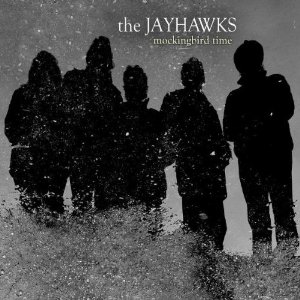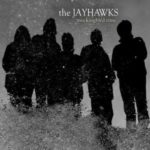
The Jayhawks formed in the late 1980’s in Minneapolis, and by the early 1990’s, they spearheaded an Americana revival with their seminal country rock. After releasing Tomorrow The Green Grass in 1995, which featured their biggest hit, “Blue,” founding member Mark Olson quit the band at the peak of its popularity. As The Jayhawks most identifiable quality was the gorgeous Americana blend of Olson’s voice with that of his singing partner Gary Louris, the band’s sound was never the same after Olson departed. Although The Jayhawks soldiered on with Louris at the helm for another decade, this reunited lineup of the band has not been in the studio together since 1995. But after Ready For The Flood, an acoustic collaboration between Olson and Louris in 2009, and a few shows together in 2010, the classic Jayhawks lineup has finally reunited with a new album, Mockingbird Time. Change is generally a good thing, but perhaps the best compliment I can give Mockingbird Time is that fifteen years later, The Jayhawks sound the same as ever. Don’t get me wrong, The Jayhawks have evolved, and this album is far from a replication of Tomorrow The Green Grass. But that essence of The Jayhawks – the sweet harmonies of Louris and Olson, songs full of beautiful natural imagery that is purely Minnesotan, and country infused rock and roll – is just as strong after a fifteen-year break.
Although The Jayhawks’ breezy Americana is heavily influenced by The Byrds, The Flying Burrito Brothers and Crosby, Stills & Nash, they have always had their own sound because of the angelic combination of Olson and Louris’ voices. The album kicks off with the two singing as well as ever together over lazy electric guitars and honky tonk piano on “Hide Your Colors.” The pair is again in perfect harmony on “She Walks In So Many Ways,” the catchiest song on the new album, which sounds straight out of The Byrds catalogue with jangly electric guitar. With piercing electric guitar and pedal steel guitar solos, “Tiny Arrows” is the kind of folky psychedelia that characterized David Crosby’s solo debut, and the vocal harmonies on the refrain of “Childhood washed away, where did it go?” are absolutely haunting.
The Jayhawks have grown as individuals and musicians over the past fifteen years, and as a result, Mockingbird Time does find the band diving into some new terrains. Highlighted by sparring guitars on “Tiny Arrows,” Mockingbird Time finds the band letting the songs breathe with some well-executed solos and experimenting more with musical structure. The Jayhawks haven’t recorded anything like “High Water Blues” before, which appears to be a poppy rock and roller before the band suddenly dives into an intense bluegrass raga. “Guilder Annie” transforms from pleasant country rock to stinging psychedelia and back, and somehow the band manages to pull it off. On the other hand, the band employs a fiddle on “Black Eyed Susan,” which gives the track more of a straight country flavor than most of The Jayhawks’ work.
Mockingbird Time’s title track is conveniently placed in the middle of the album, serving as the centerpiece. “Mockingbird Time” opens with sparse piano and a nostalgic first line (“Yesterday is gone like the wind, like the wind it is gone)”, but it quickly grows into a lush celebration of life. The lyrics are rich with gorgeous natural imagery, featuring lines like “The clouds hear our song” and “There’s so much color in the skies that’s in your eyes.” When Louris and Olson sing the refrain of “I want to make something for you that brings you joy,” their voices have never sounded more tender and joyous. With Mockingbird Time, Olson and Louris certainly delivered on that promise, and are bringing great joy to fans that have been waiting for a reunion like this for the past fifteen years.



No Comments comments associated with this post